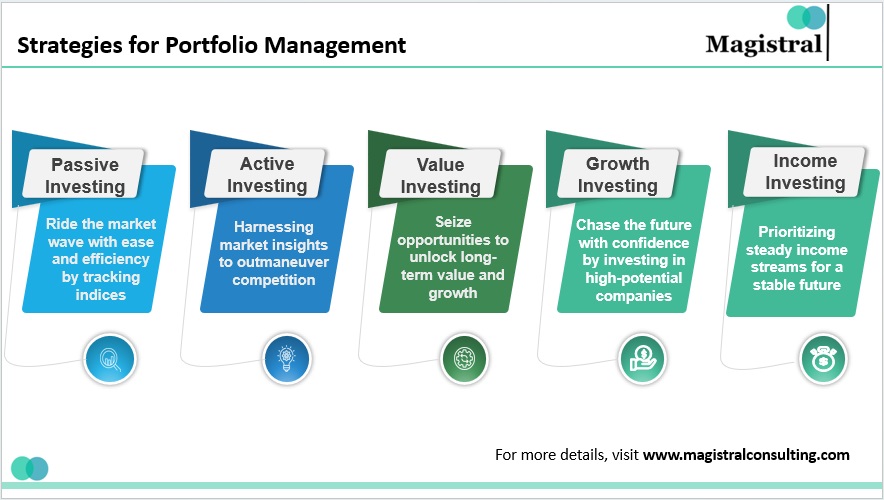Introduction
Portfolio and fund management play a crucial role in financial success for individuals and institutions. Whether you’re an investor looking to grow wealth or a fund manager handling client assets, understanding key principles and strategies is essential. This guide covers portfolio and fund management fundamentals, including strategies and best practices to optimize investments.
Understanding Portfolio Management
Portfolio management involves allocating assets strategically to meet investment objectives while minimizing risk. Portfolios include stocks, bonds, real estate, commodities, and alternative investments. The primary goals are capital preservation, appreciation, and risk mitigation.
Diversification is key, spreading investments across asset classes, sectors, and regions to reduce risk. Asset allocation involves determining the right mix of assets based on risk tolerance, investment horizon, and financial goals.
Portfolio Management Strategies
Several strategies can be employed in portfolio management to achieve specific objectives:

Strategies for Portfolio Management
Passive Investing
Passive investing tracks market indices using low-cost index funds or ETFs to mirror overall market performance. The objective is to mirror the performance of the overall market while keeping fees and transaction costs minimal.
Active Investing
Active investing involves buying and selling securities to outperform the market, requiring research and analysis. This requires thorough research, market analysis, and continuous monitoring of portfolio holdings.
Value Investing
Value investing focuses on identifying undervalued stocks trading below intrinsic value for long-term gains. Investors following this strategy seek to capitalize on market inefficiencies and generate long-term returns.
Growth Investing
Growth investing targets companies with strong earnings growth potential, often carrying higher risk. While this involves higher levels of risk, it can lead to significant capital appreciation over time.
Income Investing
Income investing prioritizes investments that generate steady income, such as dividends or interest payments. This strategy is commonly favored by retirees or investors seeking reliable cash flow.
Risk Management
Risk management is a vital component of portfolio management, playing a central role in protecting against potential losses and safeguarding capital. Below are some common risk management techniques:
Asset Allocation
Asset allocation spreads investments across different asset classes to reduce reliance on a single market. This diversification strategy plays a crucial role in mitigating the impact of underperformance in one asset class on the overall portfolio, thereby enhancing its stability and resilience.
Portfolio Rebalancing
Regularly assessing and adjusting a portfolio is vital to ensure it stays aligned with the investor’s risk tolerance and investment objectives. Market shifts and fluctuations in asset performance may lead to deviations from the desired asset allocation over time. Portfolio rebalancing adjusts asset allocations periodically to maintain risk levels and investment objectives.
Stop-loss Orders
Utilizing stop-loss orders set predefined prices for selling securities to limit potential losses. By employing stop-loss orders, investors safeguard their investments from substantial declines in value, thus lessening the impact of unfavorable market shifts on the portfolio.
Hedging Strategies
Hedging strategies use derivatives like options or futures to protect against adverse market movements. These strategies are aimed at protecting against adverse price movements in specific securities or asset classes. For example, investors might use options to hedge against downside risk in their equity holdings or utilize futures contracts to hedge against fluctuations in commodity prices.
Fund Management: Overview and Strategies
Fund management involves overseeing pooled investments such as mutual funds, hedge funds, ETFs, and pension funds. Fund managers make investment decisions, execute trades, and ensure compliance with fund objectives.
Types of Funds
Mutual Funds
They are pooled investments managed by professionals across various securities.
Hedge Funds
Hedge funds use diverse strategies like long-short equity and global macro to maximize returns.
Exchange-Traded Funds (ETFs)
ETFs are traded on exchanges, tracking market indices or specific asset classes.
Pension Funds
These are employer-sponsored retirement funds investing in diversified assets.
Fund Management Strategies
Fund management strategies encompass a range of approaches used by fund managers to achieve specific investment objectives while mitigating risk. Here are some common fund management strategies:

Fund Management Strategies
Benchmarking
This measures fund performance against relevant indices.
Active vs. Passive Management
It requires fund managers to decide between hands-on investment strategies or index tracking.
Risk Management
Risk Management implements diversification, hedging, and portfolio optimization to protect investor capital.
Performance Evaluation
Performance Evaluation analyzes metrics like risk-adjusted returns, alpha, and Sharpe ratio to assess fund success.
Regulatory Environment and Compliance
Fund managers operate under strict regulations enforced by authorities such as the SEC in the USA and FCA in the UK. Adhering to regulatory requirements ensures investor confidence and legal compliance.
Magistral Consulting’s Services in Portfolio and Fund Management
Magistral Consulting offers a comprehensive suite of services tailored to investors and businesses in portfolio and fund management.
Portfolio Management
Portfolio management involves allocating assets strategically to meet investment objectives while minimizing risk. Magistral provides customized investment strategies using market analysis, risk assessment, and strategic asset allocation.
ESG Compliance Monitoring
Environmental, social, and governance (ESG) aspects play a major role in influencing investment decisions in the contemporary socially conscious world. Magistral Consulting helps clients integrate environmental, social, and governance factors into investment decisions.
Outsourced CFO and Financial Reporting
We provide outsourced CFO services to companies looking for strategic financial assistance without the overhead of a full-time CFO. Magistral also offers financial planning, budgeting, forecasting, and financial statement reporting.
Business Development Support for Portfolio and Fund Management
Magistral goes beyond traditional financial services, offering business development support to help clients identify growth opportunities and expand their market presence.
assists with market expansion, procurement support, fund administration, and operational streamlining.
About Magistral Consulting
Magistral Consulting has helped multiple funds and companies in outsourcing operations activities. It has service offerings for Private Equity, Venture Capital, Family Offices, Investment Banks, Asset Managers, Hedge Funds, Financial Consultants, Real Estate, REITs, RE funds, Corporates, and Portfolio companies. Its functional expertise is around Deal origination, Deal Execution, Due Diligence, Financial Modelling, Portfolio Management, and Equity Research
For setting up an appointment with a Magistral representative visit www.magistralconsulting.com/contact
About the Author
The article is authored by the Marketing Department of Magistral Consulting. For any business inquiries, you can reach out to prabhash.choudhary@magistralconsulting.com

